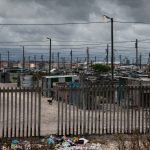Lockdown must not lead to creeping mass eviction
As South Africa navigates the uncharted waters of its lockdown, what it holds for people confined to densely populated and under-serviced shack settlements is of grave concern.
Author:
27 March 2020

In a crisis, states – and other actors – are able to do things that would have been impossible in more ordinary times. This opens new terrains of possibility for the left and the right. In recent days, right-wing governments around the world have instituted policies that would have been seen as entirely unrealistic left-wing extremism by mainstream opinion just a few weeks ago. This has led to a certain optimism among some progressive thinkers, but we should recall that the global history of the pandemic is one of rapid shifts to both new forms of inclusion and exclusion.
The social forces that are best organised are the ones that tend to have the most influence in shaping the resolution of a crisis. For this reason, it is vital that social distancing is simultaneously accompanied by innovative forms of social solidarity and organisation. This is a time, for those who can, to stay home from work, but it is not a time to retreat from progressive political commitment.
In South Africa, we have seen both potentially progressive and alarmingly reactionary currents, such as xenophobic and authoritarian language, in recent statements by government officials. It’s not entirely clear how the shutdown will play out, and there have been some possibly worrying developments.
Lockdown concerns
The scientific logic behind the shutdown and the attempt to achieve significant social distancing seems clear. However, there are some serious concerns. One is that the best medical model for reducing the rate of Covid-19 infection does not only require social distancing. It also requires the widespread testing of people with symptoms, along with the isolation of those who test positive, and the careful tracing of all the people with whom they have been in contact. The South African state has moved quickly to impose a plan to enforce social distancing, but there does not seem to be an equally comprehensive plan to ensure mass testing and follow-up.
A second significant concern is the authoritarian posture and rhetoric of ministers like Bheki Cele and Fikile Mbalula, both of whom have a history of authoritarianism and buffoonery. As we all know in the wake of the Marikana massacre, and numerous other instances of unarmed protestors being murdered, repeated instances of torture in police custody and the sadism with which various kinds of men with guns, from the police and prison warders to eviction crews, frequently carry out their work, the authoritarianism that marked the South African state since its inception did not come to an end in 1994. Great care needs to be taken to ensure that the new powers given to the police and army are not abused.
Related article:
A third significant concern is that much of the advice that is being given in regard to social distancing assumes that everyone lives in a house equipped with access to water and sanitation. The reality is that millions of people live in shacks, and for these people many of the recommendations for social distancing are simply not viable. There are many shack settlements with no or very limited access to sanitation. There are also many shack settlements in which hundreds or even thousands of people share a single, and at times unreliable, tap. Moreover, many people living in shack settlements will not be able earn a living during the shutdown and will quickly run out of food. Abahlali baseMjondolo, the largest popular movement to have emerged in post-apartheid South Africa, issued a statement on 22 March 2020 that detailed a set of cogent concerns about the way forward for shack dwellers.
Two days later, Minister of Human Settlements, Water and Sanitation Lindiwe Sisulu acknowledged some of the problems that will confront shack dwellers during the shutdown and said that a number of shack settlements would be subject to “de-densification”. No clarity was provided on exactly how this process would be carried out. New Frame is not aware of any group of organised shack dwellers who have been consulted on the plan for “de-densification”. Unsurprisingly, organised shack dwellers responded with alarm. Axolile Notywala from Ndifuna Ukwazi in Cape Town said that “de-densification is just a fancier word for forced eviction”.
History of state violence
In this time we need to recall that South Africa’s brutal history of spatial segregation was often enforced by state violence undertaken in the name of sanitation and health. In Cape Town, armed attempts to exclude Africans from the city began with an outbreak of bubonic plague in 1901. The plague had been brought to the city by rats in the hay bales that accompanied horses imported from Argentina for use in the South African War, but it was Africans who were stigmatised as unsanitary. Single migrant African workers were supposed to be confined to the Docks Native Location and African families to the Ndabeni Township, the first township to be built for African people in South Africa. Thousands were moved there at bayonet point. It had no streets or lighting, was adjacent to a sewage dump and surrounded with a barbed wire fence that was patrolled. It was a carceral space, a ghetto.
Maynard Swanson, an American academic, coined the influential term “sanitation syndrome” to describe how, following the plague in Cape Town, white administrators – and the white public in general – used medical language, and in particular claims about the risk of infection, to justify segregation. Instead of providing adequate services to black people in the places where they lived, they were forcibly removed from city centres to segregated peripheral ghettoes.
Related article:
In 1934, ad hoc processes of “slum clearance” were given legislative support when the Slum Clearance Act became a national law. Its drafters described its purpose as the making of “comprehensive provision for the elimination of slums”. The act sought to ensure that once an area was declared a slum, there was no legal defence against eviction or right to make claims against the state for its conduct during evictions. The first African township in Durban, Lamontville, which at the time was outside the city, was created in 1934 for people removed from their centrally located homes under the act.
In many respects, housing policy in South Africa after apartheid took a neo-apartheid rather than a post-apartheid form. People living in shack settlements, sometimes centrally located, were subject to eviction at gunpoint and either left homeless or forcibly removed to tiny, badly constructed homes, in every way inferior to the township homes built under apartheid, far from city centres and from opportunities for work, education and the other opportunities and possibilities of urban life.
Brutal housing policy
None of the ministers appointed to run the housing portfolio since 1994 have been able to envisage, let alone implement, anything like a genuinely post-apartheid approach to housing.
However, the most controversial and contested tenure was certainly that of Sisulu as minister of housing, and then human settlements, between 2004 and 2009. In 2005 she announced, in a more or less word-for-word repetition of colonial language, that she had resolved to “eradicate slums” by 2014. This resulted in violent evictions around the country that, in many cases, left people homeless.
Her “flagship” project, the N2 Gateway Project in Cape Town, was widely condemned for its top-down approach. It resulted in the mass eviction of residents of the Joe Slovo settlement along the N2 to the wastelands of Delft. Sisulu conducted herself in a highly authoritarian manner, even threatening residents of Joe Slovo that “if they choose not to cooperate with government, they will be completely removed from all housing waiting lists”. She had no lawful authority to make this kind of threat. The “temporary relocation area” set up in Delft in 2007, which came to be known as Blikkiesdorp, took a carceral form and was repeatedly compared to a concentration camp. It became an international scandal. It is still there.
Related article:
Sisulu was a strong supporter of the Elimination and Prevention of Re-emergence of Slums Act passed by the KwaZulu-Natal legislature in 2007 and planned to be adopted across the country. The act, which was found to be unconstitutional by the Constitutional Court in 2009, had striking similarities to the 1934 Slums Act and aimed to compel the state and private landowners to evict shack dwellers.
A progressive government would deal with the housing crisis by providing safe, dignified and well-located housing at scale, and urgently providing basic services such as water, sanitation and electricity to people still living in shacks while waiting for housing. All of this would be undertaken in a democratic and consultative manner. However Sisulu sought to deal with the housing crisis in an authoritarian manner that aimed to destroy the already precarious and inadequate homes of people without access to formal housing, and to forcibly remove people to carceral spaces on the urban periphery. Her actions were bitterly contested from below, particularly in Cape Town and Durban, in the form of road blockades, occupations and legal action.
Related article:
In light of Sisulu’s shameful history in her first tenure as minister of housing, and the way in which her actions were vigorously contested from below, there is legitimate concern that “de-densification” may be carried out in an authoritarian manner, that it may exploit the current crisis and misuse urgent concerns about sanitation to resurrect previously failed attempts at mass eviction, and that popular opposition to “de-densification” may be subject to authoritarian responses.
New Frame will seek to invest close attention in how “de-densification”, and other aspects of the shutdown, unfold in the days and weeks to come.




